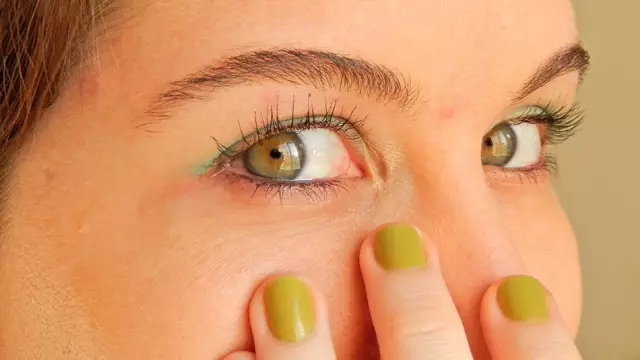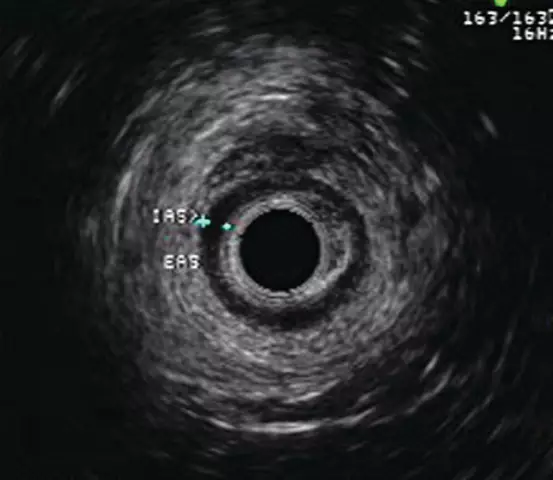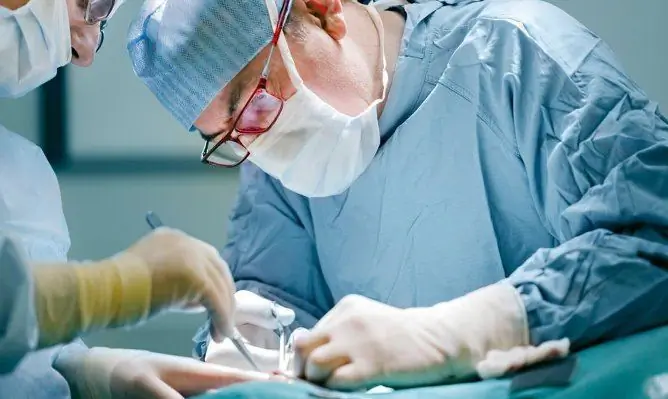- Author Rachel Wainwright wainwright@abchealthonline.com.
- Public 2023-12-15 07:39.
- Last modified 2025-11-02 20:14.
Anal fissure
Anal fissure is a violation of the integrity of the mucous membrane of the anus, which can be caused by both external mechanical damage and natural physiological processes.
Anal fissure: types of fissures, causes and risk factors

An anal fissure is a defect in the lining of the anal canal. A fissure in the anal canal is one of the most common reasons for visiting a proctologist. Cracks can have different locations. Damage occurs regardless of the age and gender of a person. Although according to statistics, young women are most susceptible to fissures in the anal canal.
According to the nature of the course of the disease, acute anal fissures and chronic fissures are distinguished. Acute anal fissure is a spontaneously occurring violation of the integrity of the mucous membrane, as a rule, healing on its own within 1 to 2 days without the use of medications. An acute fissure has even, smooth edges, a slit-like shape, its bottom is the muscle tissue of the sphincter of the anus (the main muscle of the anal canal, which holds the feces). Its length rarely exceeds 2 cm. If the fracture healing process is disturbed, the defect becomes severe and a chronic anal fissure develops.
Chronic cracks form from open (non-healing) sharp cracks, which, as a result of repeated mechanical damage, increase in size and become infected with microbes from the stool. The bottom and edges of a chronic fissure are covered with granules with a fibrous coating. With a long flow, connective tissue grows along the edges of the crack, the edges themselves become denser, undergoing trophic changes. In the area of a chronic anal fissure, areas of excess tissue are formed, which in the future can develop into fibrous polyps.
Acute anal fissures respond to conservative treatment, while a chronic anal fissure requires surgical correction.
Among the many reasons for the appearance of anal fissures are:
- Damage to the mucous membrane of the anal passage by feces;
- Tissue trauma when foreign bodies are introduced into the anal canal (anal sex, enema);
- Violation of the blood supply to the rectal region;
- Diseases of the rectum (hemorrhoids);
- Violation of the innervation of the rectum;
- Sphincter spasm;
- Stool disorder (chronic diarrhea, constipation);
- Anatomical features of the structure of the anus.
Risk factors for developing anal fissures are:
- Diseases (colitis, enterocolitis, hemorrhoids, gastric ulcer and duodenal ulcer, gastritis, cholecystitis);
- Improper diet that causes constipation and indigestion;
- Failure to comply with personal hygiene;
- Sedentary lifestyle.
Anal fissure: symptoms of a defect in the anal canal
An anal fissure is characterized by the following symptoms:
- Spasm of the anus (sphincter spasm);
- Sharp pain during bowel movements;
- Aching pain at rest;
- Impurities of blood in the feces;
- Minor spotting between bowel movements;
- Difficulty defecating;
- Purulent discharge from the anus with an unpleasant odor (with chronic anal fissures).
With an anal fissure, the symptoms often copy the signs of hemorrhoids, rectal cancer. If one of the symptoms is found, it is very important to consult a doctor in a timely manner to exclude serious diseases that threaten human health and life.
An anal fissure often has no obvious symptoms. With the transition of an acute crack into a chronic form, the patient may begin to worry about pain during prolonged sitting, wearing a certain type of underwear.
In chronic forms of anal fissures, the symptoms of which can be both specific signs (bleeding during bowel movements) and general signs (painful sensations, difficulty defecating), the risk of developing inflammatory processes increases with improper treatment.
Anal fissure: surgery and conservative treatment
Acute anal fissures respond well to conservative treatment, while in chronic anal fissure surgery is the only effective treatment.

Before starting treatment for an anal fissure, it is necessary to correctly diagnose and eliminate the causes of damage, since an anal fissure is only a consequence of the effects of factors that injure the tissues of the anus.
Conservative methods of treating anal fissure involve the normalization of stool and bowel movements. For this, a special diet is recommended, softening of feces with oil microclysters, mild laxatives, which should be prescribed by the attending physician.
Thermal procedures have a good therapeutic effect: heating pads on the perineum, sitz hot baths. The heat relaxes the muscle tissue, which can help relieve sphincter spasms. It is also recommended to use suppositories that help reduce pain syndrome, rapid tissue healing.
For chronic anal fissure, surgery is the fastest, most effective and painless method to eliminate the problem. By itself, a chronic fissure causes significant physical and psychological discomfort. Conservative treatment can only aggravate the problem. If no improvement is observed within 2 weeks, then surgical excision of the crack is performed. To prevent anal fissures, surgery also involves a partial sphincterotomy (partial dissection of the anal sphincter). The rehabilitation period after surgery lasts about a week, when patients are shown bed rest, a special diet and drug therapy.
If anal fissures recur in a patient, surgery without sphincterotomy will only eliminate the next fissure without solving the problem of new fissures in the future.
The prognosis after surgical excision of anal fissures is favorable. With proper timely treatment, anal fissures heal quickly.
Treatment of anal fissure with folk remedies
Among the main folk methods of treating rectal fissures, tampons moistened with herbal infusions are distinguished. So, the introduction of tampons soaked in infusions of medicinal herbs (chamomile, calendula, oak bark) is one of the most effective methods of treating rectal fissures using folk methods. Honey, castor oil, aloe juice and pulp are also used to soak tampons. Of the herbs for the treatment of anal fissure with folk remedies, St. John's wort, celandine, yarrow, plantain, knotweed herb are used.
Treatment of rectal fissure with folk remedies should be combined with diet, procedures for softening stool (enemas, laxatives).
Folk remedies are the most effective in isolated cases of acute cracks, however, when cracks develop into chronic forms, it is recommended to immediately consult a doctor.
YouTube video related to the article:
The information is generalized and provided for informational purposes only. At the first sign of illness, see your doctor. Self-medication is hazardous to health!






